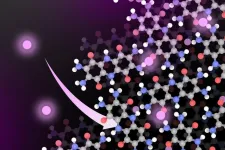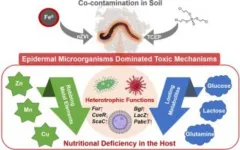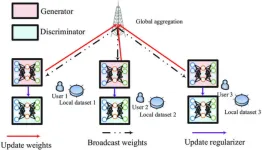(Press-News.org) CAMBRIDGE, MA – Many electric vehicles are powered by batteries that contain cobalt — a metal that carries high financial, environmental, and social costs.
MIT researchers have now designed a battery material that could offer a more sustainable way to power electric cars. The new lithium-ion battery includes a cathode based on organic materials, instead of cobalt or nickel (another metal often used in lithium-ion batteries).
In a new study, the researchers showed that this material, which could be produced at much lower cost than cobalt-containing batteries, can conduct electricity at similar rates as cobalt batteries. The new battery also has comparable storage capacity and can be charged up faster than cobalt batteries, the researchers report.
“I think this material could have a big impact because it works really well,” says Mircea Dincă, the W.M. Keck Professor of Energy at MIT. “It is already competitive with incumbent technologies, and it can save a lot of the cost and pain and environmental issues related to mining the metals that currently go into batteries.”
Dincă is the senior author of the study, which appears today in the journal ACS Central Science. Tianyang Chen PhD ’23 and Harish Banda, a former MIT postdoc, are the lead authors of the paper. Other authors include Jiande Wang, an MIT postdoc; Julius Oppenheim, an MIT graduate student; and Alessandro Franceschi, a research fellow at the University of Bologna.
Alternatives to cobalt
Most electric cars are powered by lithium-ion batteries, a type of battery that is recharged when lithium ions flow from a positively charged electrode, called a cathode, to a negatively electrode, called an anode. In most lithium-ion batteries, the cathode contains cobalt, a metal that offers high stability and energy density.
However, cobalt has significant downsides. A scarce metal, its price can fluctuate dramatically, and much of the world’s cobalt deposits are located in politically unstable countries. Cobalt extraction creates hazardous working conditions and generates toxic waste that contaminates land, air, and water surrounding the mines.
“Cobalt batteries can store a lot of energy, and they have all of features that people care about in terms of performance, but they have the issue of not being widely available, and the cost fluctuates broadly with commodity prices. And, as you transition to a much higher proportion of electrified vehicles in the consumer market, it’s certainly going to get more expensive,” Dincă says.
Because of the many drawbacks to cobalt, a great deal of research has gone into trying to develop alternative battery materials. One such material is lithium-iron-phosphate (LFP), which some car manufacturers are beginning to use in electric vehicles. Although still practically useful, LFP has only about half the energy density of cobalt and nickel batteries.
Another appealing option are organic materials, but so far most of these materials have not been able to match the conductivity, storage capacity, and lifetime of cobalt-containing batteries. Because of their low conductivity, such materials typically need to be mixed with binders such as polymers, which help them maintain a conductive network. These binders, which make up at least 50 percent of the overall material, bring down the battery’s storage capacity.
About six years ago, Dincă’s lab began working on a project, funded by Lamborghini, to develop an organic battery that could be used to power electric cars. While working on porous materials that were partly organic and partly inorganic, Dincă and his students realized that a fully organic material they had made appeared that it might be a strong conductor.
This material consists of many layers of TAQ (bis-tetraaminobenzoquinone), an organic small molecule that contains three fused hexagonal rings. These layers can extend outward in every direction, forming a structure similar to graphite. Within the molecules are chemical groups called quinones, which are the electron reservoirs, and amines, which help the material to form strong hydrogen bonds.
Those hydrogen bonds make the material highly stable and also very insoluble. That insolubility is important because it prevents the material from dissolving into the battery electrolyte, as some organic battery materials do, thereby extending its lifetime.
“One of the main methods of degradation for organic materials is that they simply dissolve into the battery electrolyte and cross over to the other side of the battery, essentially creating a short circuit. If you make the material completely insoluble, that process doesn’t happen, so we can go to over 2,000 charge cycles with minimal degradation,” Dincă says.
Strong performance
Tests of this material showed that its conductivity and storage capacity were comparable to that of traditional cobalt-containing batteries. Also, batteries with a TAQ cathode can be charged and discharged faster than existing batteries, which could speed up the charging rate for electric vehicles.
To stabilize the organic material and increase its ability to adhere to the battery’s current collector, which is made of copper or aluminum, the researchers added filler materials such as cellulose and rubber. These fillers make up less than one-tenth of the overall cathode composite, so they don’t significantly reduce the battery’s storage capacity.
These fillers also extend the lifetime of the battery cathode by preventing it from cracking when lithium ions flow into the cathode as the battery charges.
The primary materials needed to manufacture this type of cathode are a quinone precursor and an amine precursor, which are already commercially available and produced in large quantities as commodity chemicals. The researchers estimate that the material cost of assembling these organic batteries could be about one-third to one-half the cost of cobalt batteries.
Lamborghini has licensed the patent on the technology. Dincă’s lab plans to continue developing alternative battery materials and is exploring possible replacement of lithium with sodium or magnesium, which are cheaper and more abundant than lithium.
END
Cobalt-free batteries could power cars of the future
MIT chemists developed a battery cathode based on organic materials, which could reduce the EV industry’s reliance on scarce metals
2024-01-18
ELSE PRESS RELEASES FROM THIS DATE:
New study reveals the impact of skin microorganisms on earthworm toxicity in polluted environments
2024-01-18
Epidermal microorganisms, vital in nutrient exchange between hosts and environments, have now been shown to play a key role in host toxicity through community changes. This research highlights how changes in the community of skin-based microbes correlate more significantly with earthworm toxicity than those in intestinal microorganisms, especially under combined soil contaminations.
A new study (https://doi.org/10.1016/j.eehl.2023.11.001) published in the journal Eco-Environment & Health, researchers from Zhejiang University revealed the crucial role of epidermal microorganisms in influencing earthworm toxicity under environmental stress, notably in conditions ...
Scientists, farmers and managers work together to avoid the decline of the little bustard, an endangered steppe bird
2024-01-18
The collaboration between scientists, farmers and managers is crucial to improve the protection of the little bustard, an endangered steppe-land bird in Spain due to human activity. The reduction of natural habitats, the increase in irrigation and the urbanization of the land have led to having less surface areas that guarantee the survival of this vulnerable species. An article published in the journal Biological Conservation reveals how cooperation between different actors is key to finding answers and avoiding the decline of the most threatened populations of the little bustard.
The study, a pioneer example of adaptative conservation, ...
Better wireless communication made possible through machine learning
2024-01-18
In today's increasingly interconnected world, high-quality communication has become more vital than ever. Accurately estimating the dynamic status of communication channels is a key factor in achieving this. Recently, a joint research team designed a new algorithm that offers high-level estimation accuracy and privacy protection with low computational and communication costs. This research was published Jan. 5 in Intelligent Computing, a Science Partner Journal.
This new algorithm uses a specially designed deep learning model for precise estimation and a federated learning framework ...
Study with over 11,000 individuals of African descent finds genetic variants linked to glaucoma
2024-01-18
Glaucoma is the leading cause of irreversible blindness around the globe, affecting up to 44 million people. Although people of African ancestry are most frequently and severely affected by this hereditary disease, its genetic underpinnings in this population have rarely been studied. Now, a team of investigators has published findings revealing previously unknown inherited genetic variants that contribute to primary open-angle glaucoma (POAG), the most common form of the disease. The study was based on the analysis of 11,275 individuals of African descent and is being published January 18, 2024, in Cell.
“Individuals with African ancestry are five times more likely to be affected ...
Economics: Sea level rises could cost EU and UK economies up to 872 billion Euros by 2100
2024-01-18
Damage caused by sea level rises could cost the EU and UK economies up to 872 billion Euros in total by the end of the century, according to a modelling study published in Scientific Reports.
Ignasi Cortés Arbués, Theodoros Chatzivasileiadis, Tatiana Filatova and colleagues modelled the potential economic impacts of sea level rises for 271 European regions by 2100 under a high emissions scenario (SSP5-RCP8.5) with no new coastal protection measures implemented after 2015. They combined ...
Genetics: Chewing over poor Mesolithic oral health
2024-01-18
Members of a hunter-gatherer group that lived in south-western Scandinavia during the Mesolithic era — approximately 10,000 years ago — may have been affected by tooth decay and gum disease, according to a study published in Scientific Reports.
Emrah Kırdök, Anders Götherström and colleagues sequenced the DNA found on three pieces of birch tar — a substance made from heated birch bark — that were excavated in the 1990s from Huseby Klev, Sweden and have been dated to between 9,890 ...
Mega-analysis identifies gene variants associated with glaucoma in people of African ancestry
2024-01-18
PHILADELPHIA— A new analysis focusing specifically on people of African ancestry identified three gene variants that may be contributing to this population’s susceptibility to developing and being blinded by glaucoma. People of African ancestry are five times as likely as others to develop glaucoma and up to 15 times as likely to be blinded by the condition, but the vast majority of research has used data from people of European ancestry. Led by researchers at the Perelman School of Medicine at the University ...
Third major study finds evidence that daily multivitamin supplements improve memory and slow cognitive aging in older adults
2024-01-18
By 2060, according to the Alzheimer’s Association, nearly one in four Americans will be in an age bracket at elevated risk of cognitive decline and Alzheimer’s disease unless interventions can help preserve cognitive function before deficits begin. The COcoa Supplement and Multivitamin Outcomes Study (COSMOS) is a large-scale, nationwide, randomized trial rigorously testing cocoa extract and multivitamin supplements directed by researchers at Mass General Brigham. Two previously published studies of cognition in COSMOS suggested a positive effect for a daily multivitamin. ...
Nurse home visits have a lasting impact for disadvantaged mothers and daughters
2024-01-18
Nurse home visits to disadvantaged mothers can significantly reduce their rates of hypertension and their daughters’ likelihood of obesity, finds a new reanalysis of health data by a team led by a UCL researcher.
The study, published in the journal JAMA Network Open, reanalysed data taken as part of a Nurse-Family Partnership trial started more than 30 years ago – The Memphis New Mothers Study (1990-1994). The researchers found that prenatal and infancy nurse home visits decreased the likelihood of daughters being obese by 55% and being severely obese by 81% in adolescence. Similarly, mothers of girls showed a decrease ...
Cannabis and driving in older adults
2024-01-18
About The Study: The findings of this study that included 31 participants ages 65 to 79 suggest that older drivers, even if they regularly use cannabis, show evidence of impaired driving performance after smoking cannabis. Weaving was increased and speed was decreased at 30 minutes after smoking, which was not correlated with blood tetrahydrocannabinol (THC) concentrations; subjective experience and self-reports of impaired driving persisted for three hours.
Authors: Patricia Di Ciano, Ph.D., of the Centre for Addiction ...
LAST 30 PRESS RELEASES:
Why conversation is more like a dance than an exchange of words
With Evo 2, AI can model and design the genetic code for all domains of life
Discovery of why only some early tumors survive could help catch and treat cancer at very earliest stages
Study reveals how gut bacteria and diet can reprogram fat to burn more energy
Mayo Clinic researchers link Parkinson's-related protein to faster Alzheimer's progression in women
Trends in metabolic and bariatric surgery use during the GLP-1 receptor agonist era
Loneliness, anxiety symptoms, depressive symptoms, and suicidal ideation in the all of us dataset
A decision-support system to personalize antidepressant treatment in major depressive disorder
Thunderstorms don’t just appear out of thin air - scientists' key finding to improve forecasting
Automated CT scan analysis could fast-track clinical assessments
New UNC Charlotte study reveals how just three molecules can launch gene-silencing condensates, organizing the epigenome and controlling stem cell differentiation
Oldest known bony fish fossils uncover early vertebrate evolution
High‑performance all‑solid‑state magnesium-air rechargeable battery enabled by metal-free nanoporous graphene
Improving data science education using interest‑matched examples and hands‑on data exercises
Sparkling water helps keep minds sharp during long esports sessions
Drone LiDAR surveys of abandoned roads reveal long-term debris supply driving debris-flow hazards
UGA Bioinformatics doctoral student selected for AIBS and SURA public policy fellowship
Gut microbiome connected with heart disease precursor
Nitrous oxide, a product of fertilizer use, may harm some soil bacteria
FAU lands $4.5M US Air Force T-1A Jayhawk flight simulator
SimTac: A physics-based simulator for vision-based tactile sensing with biomorphic structures
Preparing students to deal with ‘reality shock’ in the workplace
Researchers develop beating, 3D-printed heart model for surgical practice
Black soldier fly larvae show promise for safe organic waste removal
People with COPD commonly misuse medications
How periodontitis-linked bacteria accelerate osteoporosis-like bone loss through the gut
Understanding how cells take up and use isolated ‘powerhouses’ to restore energy function
Ten-point plan to deliver climate education unveiled by experts
Team led by UC San Diego researchers selected for prestigious global cancer prize
Study: Reported crop yield gains from breeding may be overstated
[Press-News.org] Cobalt-free batteries could power cars of the futureMIT chemists developed a battery cathode based on organic materials, which could reduce the EV industry’s reliance on scarce metals





